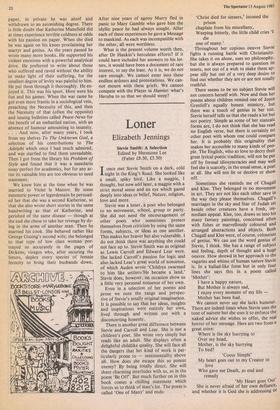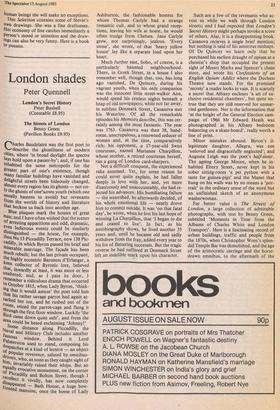Loner
Elizabeth Jennings
Stevie Smith: A Selection Edited by Hermione Lee (Faber £8.50, £3.50)
r once met Stevie Smith on a dark, cold I in the King's Road. She looked like a small, spiky bird. Like a magpie, I thought, but now add later, a magpie with a strict moral sense and an eye which gazed deeply into ideas or belief, Nature, religion, love and more.
Stevie was a loner, a poet who belonged to no movement, school, group or party. She did not need the encouragement of other poets who sometimes protect themselves from criticism by using the same forms, subjects, or ideas as one another. This makes her braver but also vulnerable. I do not think there was anything she could not face up to. Stevie Smith was as original as Lewis Carroll and Edward Lear were. She lacked Carroll's passion for logic and also lacked Lear's great world of nonsense, of which Auden wrote 'Children swarmed to him like settlers/He became a land.' Stevie does, however, on occasion show us a little very personal nonsense of her own.
Even in a selection of her poems and prose we note the range and perspec- tive of Stevie's totally original imagination. It is possible to say that her ideas, insights and inspirations were entirely her own, lived through and written out with a disconcerting honesty.
There is another great difference between Stevie and Carroll and Lear. She is not a children's poet. She wrote very simply but reads like an adult. She displays often a delightful childlike quality. She will face all the dangers that her kind of work is par- ticularly prone to — sentimentality above all. How does she escape this so potent enemy? By being totally direct. She will share charming interludes with us, as in the poem 'Be Off'. But much further on in this book comes a chilling statement which forces us to think of man's lot. The poem is called 'One of Many' and ends: 'Christ died for sinners,' intoned the prison chaplain from his miscellany, Weeping bitterly, the little child cries 'I die one of many.'
Throughout her copious oeuvre Stevie fights a running battle with Christianity. She takes it on alone, uses no philosophy, but she is always prepared to question its tenets, not out of a wish to niake them ap- pear silly but out of a very deep desire to find out whether they are or are not totally truthful.
There seems to be no subject Stevie will not concern herself with. Now and then her poems about children remind one of Joyce Grenfell's equally honest mimicry, but there was a touch of genius in her too. Stevie herself tells us that she reads a lot but not poetry. Simple as some of her stanzaic forms are, I do not think that she has read no English verse, but there is certainly no other poet with whom one could compare her. It is probably this originality that makes her accessible to many kinds of peo- ple. The English, who so love to decry their great lyrical poetic tradition, will not be put off by formal idiosyncracies and may well feel she is scarcely, in the usual sense, a poet at all. She will not lie or deceive or show off.
Sometimes she reminds me of Chagall and Klee. They belonged to no movement in art. They are not like each other save in the way they please themselves. Chagall's marriages in the sky and Star of Judah set beside other creatures have a fresh, im- mediate appeal. Klee, too, draws us into his many fantasy paintings, concerned often with fishes or marvellously coloured and arranged abstractions and objects. Both Chagall and Klee were, of course, colourists of genius. We can use the word genius of Stevie, I think. She has a range of subject and feeling, depth of thought and a huge oeuvre. How shrewd in her approach to the vagaries and whims of human nature Stevie is. In a ballad-like form but in only four lines she says this in a poem called 'Mother': I have a happy nature, But Mother is always sad, I enjoy every moment of my life Mother has been had.
We cannot never say she lacks humour. There are indeed times when Stevie uses the tone of naivete but she uses it to enforce the naked advice she wishes to offer, the real horror of her message. Here are two from a great store: Where is the sky hurrying to Over my head, Mother, is the sky hurrying To bed?
'Coeur Simple' My heart goes out to my Creator in love Who gave me Death, as end and remedy 'My Heart goes Out'
She is never afraid of her own defiance, and whether it is God she is addressing or
human beings she will make no exceptions.
This Selection contains some of Stevie's Own drawings. She was a fine draftsman. Her economy of line catches immediately a person's mood or intention and the draw- ings can also be very funny. Here is a book to possess.







































 Previous page
Previous page